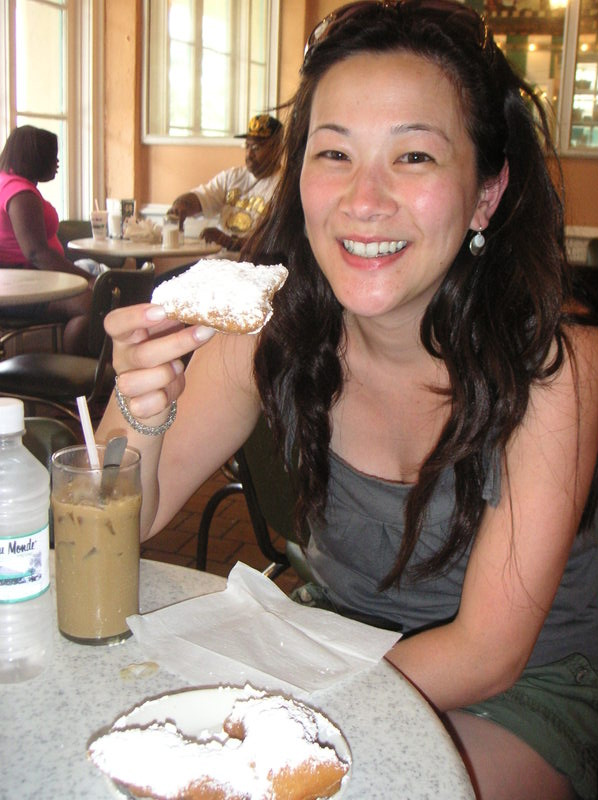
Monday, January 24, 2011
Sleep, Dormancy, Hibernation, Rest...


Fer at My Little Garden in Japan is hosting a Carnival. Hop over there and see what other gardeners in the world are resolving for 2011.
Saturday, January 22, 2011
GTTC - midnight popcorn, sweet potato pudding (with rum raisins), cuteness
 Do you like these containers? My mom folds these when she's over babysitting. They make great use of old magazines and are perfect little plates for snacks.
Do you like these containers? My mom folds these when she's over babysitting. They make great use of old magazines and are perfect little plates for snacks. Tuesday, January 18, 2011
Science Expo Project: coloring carnations

- Use about 20 drops of food coloring (or a good squirt if you're not watching and your 5 year old is not patient!) per 3/4 cup water (approximate - no need to measure).
- Carnations will be fully colored in about 24 hours.
- After they're colored, you can change the water. Carnations will be fresh for a good 10 days or more.
- BONUS: cut a slit in the stem. Place in 2 different colored cups of water. Predict what will happen.

Saturday, January 15, 2011
GBBD; GTTC; pondering bonsai; ch-ch-ch-chia!

Last week, both Charlotte and Holly linked with food ideas containing "carrots", which are ranked (randomly) high on my secret list of veggies. Even though they both listed other veggies as well, I just counted the one that appeared highest on my list. Any other veggies they may have written about are still in play. Both get a letter 'G'. First person to collect 'GTTC' wins. To review, Ricki has a 'G', and Meems has a 'GT'. If you're confused, review the rules in the link above. If you're still confused, just trust me and go with it. :) btw - we may not be harvesting, but if you're cooking with these seasonal veggies, it counts.
Wednesday, January 12, 2011
Why Chinese Mothers are Superior
As a Chinese daughter, a Chinese mother, and a school counselor, Amy Chua’s January 8th article turns my stomach.
Though I’m sure her somewhat sensational story of parenting has stirred up many emotions and responses, and though I doubt I will be the one to enlighten her to potential drawbacks to her parenting style, I think it’s important for readers to know being a Chinese mother does not always entail the harsh characteristics that Chua illustrates. In my opinion, what Chua describes is simply a cold, demanding, and rigid mother. As a Chinese mother myself, I am offended that she would justify her parenting by simply describing herself a Chinese mother. Additionally, I hope any readers who nodded in agreement with Chua will realize that this type of disapproving and rigid parenting can cause problems.
The reality is, there are cultural differences between Eastern and Western styles of parenting. To generalize, it is typical for Asian parents to refrain from too much boasting, too much praise, too many outward expressions of love and approval. Interestingly, like Chua, my father has also called me “garbage”. Even as a child I have always considered myself to be reflective and insightful, but unlike Chua, I did not believe that my father truly loved me until I was in my early 20’s. Based on his actions and words, I simply did not think he did. Overtly insulting your children while withholding praise, and assuming that they will understand that you love them is quite an assumption. For me, the gamble that my children might misunderstand is too great a risk to take.
I take issue with Chua’s statement that Chinese mothers assume strength, not fragility. The practice of insulting your children, of stripping the social and developmental experiences of being children, of taking the freedom to make choices from your children, of forcing them to play an instrument for hours on end, and to expect that they must be “the best” does NOT help to build or tap into innate strength. What Chua is really witnessing is not strength, but simply a good ability to tolerate punishment. Perhaps Amy Chua is “the best” at everything she does, but I certainly am not. I do not demand that my children are “the best” at what they do. Is this because I don’t have high expectations? Is this because I assume that they are fragile? No. This is because expecting perfection is unreasonable. I’m glad Lulu was eventually able to play “The Little White Donkey”. However, I think Chua is mistaken in the message that she seems to have culled from that experience. I wouldn’t want to imagine how little Lulu would have fared had she not figured out how to coordinate her hands to play the piece. When Chua shared one of her parenting moments at a dinner party, her acquaintance Marcy left in tears for a reason. Not because she heard about an instance of cultural differences in parenting, but because she heard about a mother who treated her child cruelly.
Though “The Little White Donkey” ended with a successful recital, I fear that not every experience will. In the end, I hope Chua will feel her behavior was worth it because these superficial successes come with a high cost. As a school counselor, I hear many stories from my high-achieving Asian American students that echo the same theme. A senior cries in my office when she’s rejected from Cornell. She really had a slim chance but her parents had been preparing her for Cornell beginning in fifth grade. A freshman is brought to my office by her friends when she was found crying in the bathroom after “failing” an exam. Explaining that a B is not failing does not alleviate the fear of reprisal and disappointment she feels. My junior is near a nervous breakdown when he cannot handle the AP science classes he’s forced by his parents to take (especially when his strengths and interests are actually in the humanities). I hate to break it to Chua but these students are not the pillars of strength. They are hurt, overloaded, unhappy children, who at the end of the day, are not always certain that their parents love them. If this is true, why don’t you know about this? Well, it’s because when I propose that we talk to their parents to brainstorm ways to reduce the stress, I hear, “No! Don’t tell my mom”. They fear your disapproval. They are not stronger for the trials that you place on them – they just dry their tears before they go home to you.
Every child has the right to feel loved and protected in the world. Chua’s daughters are lucky enough to have a healthy, available, and seemingly intelligent mother. It is a shame that she paints herself as a mother who wants so much to raise successful children, but whose love appears to be so conditional. I don’t know Lulu, but I know children. I’m sure she felt joy in playing around and snuggling with her mother after mastering “The Little White Donkey”, but I’m saddened that she had to work so hard for that.
Despite cultural differences, I detest the notion of polarizing two types of parenting – permissive Western parenting and demanding Eastern parenting. Somewhere there is a reasonable medium and this is why at the end of most days, I feel like an excellent Chinese mother. This Chinese mother was proud of her daughter who was cast as the equivalent of what Chua mocked as “Villager Number Six”. I was proud that as an older child, my daughter (independently) decided to start taking ballet and was able to hold her own with students who had taken ballet for 10 years. For my daughter, there was great value in spending numerous hours preparing to be someone as lowly as “Villager Number Six”. One value was the lesson that there are small pieces that go into a large production. No single part is insignificant. Though ballet is not her passion, she challenged herself to perform better, stretched herself to try something new, and made many new friends along the way. Did I praise her for her 30 second part in the 2 hour production? You bet I did.
My goal as a mother is to build (and not test) the strength in my children. I want to teach them good values and a strong work ethic that would exist whether I was next to them cracking a whip or not. I want my children to have a zest for life and to be able to make good decisions for them because I know I will not always be there to make decisions for them. I would be glad for my daughters to have a boyfriend in high school because I want them to learn for themselves the qualities they value in a person. I want them to be creative and have an ability to produce new ideas. I want them to share with me and trust in me. None of these things can happen if I am hovering over them, making decisions for them, equating success with being number one, and spying on them.
At the end of the day, there will be kids who have better grades than mine do. There will be kids who are in higher math classes. My children will likely not be playing concertos on a stage for an audience. However, they WILL be equipped with the skills to communicate well, to build meaningful relationships with people, and most importantly, be able to face life confidently with the ability to cope when things (inevitably for everyone) don’t go perfectly. And at the end of every day, my daughters will know that I always want them to work hard and be successful, but that I love them unconditionally. This is a feeling no perfect piano concerto could ever replace.
Friday, January 7, 2011
GTTC - the freezer section


































